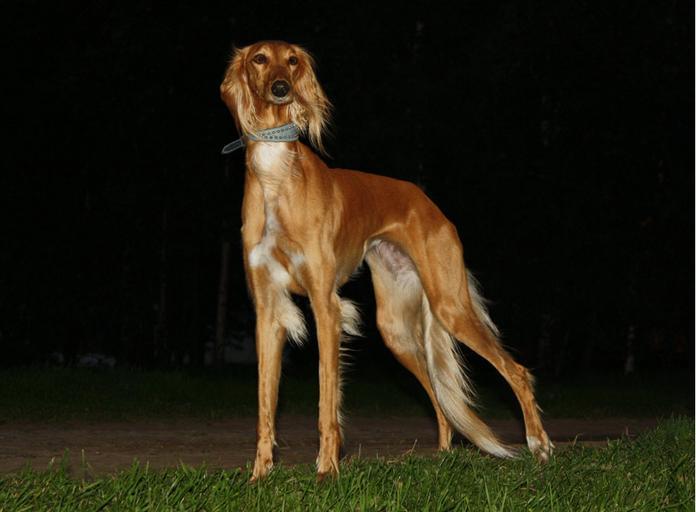
An ancient hound from the Middle East, the Saluki temperament is reserved, intelligent, and aloof.
A Brief History of the Saluki
The Saluki breed is so ancient, experts have found images at archaeological sites. Recent evidence shows depictions of Saluki dog pictures on Egyptian tomb in 2100 B.C.E (about 4,000 years ago). They were even mummified after death in Egypt.
Once called the Persian Greyhound or Gazelle Hound, Pharaohs would hunt gazelles and hares with their Salukis. Today, they are quiet and loyal companions. If you can’t stand a yappy dog, or a dog who likes to bark just to hear himself, then you’ll be relieved to know that neither of these traits describe the Saluki.
Saluki Temperament and Personality
They are aloof but devoted.
Saluki dogs are known for their aloof personality, but they are very devoted to their family.
That said, the Saluki is by no means a hugger. Like many other sight hound breeds, the Saluki can become incredibly uncomfortable if you smother him with affection, which is one of the reasons why he’s better with older children. He’d much rather lay at your feet than in your lap.
Even better – he’d much prefer to steal your couch or bed. If it’s large and comfy, it’s for him – especially if he doesn’t have to share!
On a related note, he may jump if you touch him when he doesn’t expect you to. This too is a normal personality trait for this breed.

Salukis bond with one person
Salukis tend to form a bond with one family member. When that family member is gone, Salukis can suffer from separation anxiety. So, if you have the kind of schedule that regularly keeps you out of the home for long hours at a time, then you and the Saluki are not a good match.
They are creatures of comfort
Like cats, Salukis are picky about personal cleanliness. They love to be comfortable – preferring soft bedding and a couch to lay on over the floor.
They are shy around strangers
Salukis are so devoted to their family that they tend to shy away from strangers – especially if they are not socialized properly.
Salukis get along with older children and other dogs
Despite the reserve they show towards strangers, Salukis do well in a home with older children. Young children, on the other hand, can often be too rowdy for Salukis.
I recommend you wait until your child is about 8 years old before bringing a Saluki into the home. Even if the dog if one of those rare Salukis who can tolerate clingy behavior and loud noises, the dog is still at risk of accidental injury, thanks to his fragile frame.
They do get along with other dogs but prefer other Salukis to different breeds. And you must be mindful of the Saluki’s strong prey drive. Salukis will not chase small dogs or cats in their home, but other small animals (like hamsters or rabbits) are too tempting. And at the speed at which a Saluki can travel, if he takes off after the family hamster, you aren’t going to be able to catch him to stop him.
They aren’t made for apartment life
Although quiet indoors, Salukis do need to run. They are better suited for a home with a large, secure fenced yard, rather than the confined space of an apartment.
He’s one strong dog!
Don’t be deceived by the Saluki’s appearance! He may look frail, but this dog is strong, and boy, can he run! In fact, he can actually keep up with a car, with a maximum running speed of 45 mph!
He’s just as agile of a jumper as he is a runner. Get the tallest fence available, because you’re going to need it. Saluki owners have reported their dogs jumping six feet high with no problem!
However, refrain from getting one of those underground electric fences because they do nothing to dissuade the Saluki. If he wants his prey badly enough, he’ll push right through the fencing, possibly hurting himself in the process. Not worth it.
Salukis are sensitive and intuitive

The Saluki is sensitive and can pick up on emotions. Their intuitive nature causes them to be stressed when there is tension in the home.
He has a peaceful soul…
Adult Salukis are calm and peaceful souls, but you have to pass the test in order to enjoy them this way. As puppies, these little buggers can be quite destructive, and you’ll wonder why you ever agreed to get a dog. But this phase is only temporary, and I promise, you will eventually be rewarded for your efforts and come around to loving your dog again!
…but a hunter’s heart
Don’t let those puppy eyes fool you – this dog has the heart of a hunter, and if he gets even the smallest inkling of nearby prey, he’s going to take off after it. For this reason, you must, without question, keep him on a leash when you go for walks or to the dog park. You don’t want him taking off into traffic or running so far from home in pursuit of prey that he forgets his way back.
He makes a great watchdog.
The Saluki is always on the alert, which makes him a great watchdog. What he’s not great at, however, is being a guard dog. He has no fear when he’s hunting prey, but humans are another matter altogether. So, while he’ll alert you if someone strange is on the property, he trusts that you’ll be responsible to handle the rest.
How Do You Train a Saluki?
A Saluki is not the right dog for you if you want easy obedience and complete adoration. While you can train them using positive training methods, they prefer to do it at their own speed.
Salukis don’t, however, do much wrong – aside from chewing and digging. They are not excessive pullers, they don’t bark a lot, and they are not a hyperactive breed.
Salukis will benefit from obedience training at a young age. Use positive reinforcement like treats and praise. Do not use negative training methods on the sensitive Saluki.

They are independent dogs who think for themselves, and sometimes they prefer to do something more interesting to them than training.
If you don’t make training a fun and positive experience, they are perfectly fine ignoring you.
Helpful Dog Training Resource:
The Online Dog Trainer by Doggy Dan a world-class Dog Trainer from New Zealand is worth taking a look at. This online resource has hundreds of fun informative dog training videos that can help you learn the basics and more.
Finding the Perfect Saluki
Are you ready to add a Saluki to your family?
Your first task is deciding whether you’d like a Saluki dog for sale from a breeder or a rescue organization.
The Saluki Club of America is a great place to start when deciding whether to purchase one from a breeder or adopt from a rescue organization.
Take your lifestyle into consideration when deciding between buying from a breeder or adopting from a shelter. Buying a puppy from a breeder is time-consuming and requires a lot of patience. If you don’t have time for a puppy, adopting a Saluki may be the better option.
How Much does a Saluki Cost ?
Saluki puppies for sale will cost between $600-$800. The Saluki dog price depends on litter availability, breeder location, and lineage.
A Saluki for sale from a top breed line will cost $800 or more.
Expect to pay between $200 and $400 for a rescue Saluki, depending on the location and organization.
Saluki Rescue and Adoption
The Saluki Tree of Life Alliance, Inc. is a great resource for Saluki rescue. You will find information on Saluki adoption, as well as dogs available for adoption.
An adoption is a great option for families looking for an adult Saluki or a Saluki mix. While Saluki mixes are still rare (the only one I know of is the Saluki Greyhound), you just never know what kind of wonderful oddball you may find at the shelter.
The one thing to remember about adoption, though, is you might not always have a clear picture of the dog’s background because the shelter doesn’t either.
However, if the dog has been living at the shelter for a while, then the staff may have a clearer idea of the dog’s personality. This can help them determine if the dog you’re interested in is truly a good match for you and your family.
That said, there are plenty of loving dogs in shelters who want nothing more than a good home and a warm and loving family to share it with. So, if you have the means, the time, and the patience for a dog who may need a little pruning around the edges, I highly recommend adopting your new best friend.
Saluki Breeders
If you’d rather purchase a Saluki from a breeder, check out the AKC Marketplace. You can search Saluki breeders based on location, pedigree, and whether they have litters available or coming soon.
Saluki dog breeders should be knowledgeable about the Saluki breed. They should be able to answer any questions and ask you questions in return to determine if a Saluki is right for you.
The best breeders will provide health certificates and make you aware of any known temperament issues with their litter.
Make sure to take your time researching and meeting with breeders to find the perfect one.
Caring for a Saluki
The Saluki Appearance

The adult Saluki dog weighs between 40-65 pounds, and measures at between 23 and 28 inches tall.
They come in cream, white, fawn, golden, grizzle and tan, tricolor (black, white, and tan), and black and tan.
How Do You Groom a Saluki?
Salukis have a short, silky, and smooth coat. Their entire body can be smooth or have slight feathering on their legs, back on the thighs, and shoulders.
Silky hair coats their long ears.
Salukis are low-shedders and odorless. They need weekly brushing to remove dead hair and distribute oils. Comb their feathering one to two times per week to remove any tangles.
Bathe your Saluki only when necessary. And if you’re looking for a hypoallergenic dog, the Saluki is not it. While he may not shed much, you may still be allergic to the hair he does shed, not to mention his dander, saliva, or urine.
Staying Healthy: What are the Saluki Health Issues you Must Know?
A Saluki has a life expectancy of between 10 and 17 years.
Salukis don’t suffer from many genetic health conditions, but they can develop:
- Anesthesia sensitivity
- Cardiomyopathy(a kind of heart disease),
- Hemangiosarcoma(cancer in the blood vessel lining and spleen)
- Hypothyroidism
Helpful Dog Health Resource:
Note: if you agree that your health and your dog's health should be a top priority then get a copy of The Ultimate Guide to Dog Health. Your Saluki friend will love you for it. This guide will help save you money, time and most of all help you keep your dog healthy.
Exercise
Salukis do require a moderate amount of exercise to stay fit and healthy. However, you may find it difficult to keep up with him!
They require daily (leashed) walks or runs in a large, fenced yard. They also do well in dog sports such as agility and luring.
Just make sure that if you let your Saluki out into the yard that you keep an eye on him. Not only does he like to find ways to escape the yard, but he can also become quite the chewer when he’s bored. Before you know it, he’ll have gnawed a hole right through your fence or gate!
Bottom line: this is one of those breeds whom you have to exhaust on a daily basis to help him use up all his excess energy, so it doesn’t come out as bad behavior.

Conclusion: Why the Saluki?
Although people know the Saluki temperament as aloof and quiet, they are completely devoted to their family.
This highly active breed is best suited for active families who have the time to exercise their Saluki. They do not do well in apartments and will thrive in a home with a large, fenced-in yard.
Salukis are good with older children and other dogs – though they prefer other Salukis to different breeds. They are intelligent but like to think for themselves and can be challenging to train.
If you are looking for a quiet, gentle dog who adores their family, the Saluki will make the perfect companion.

Kailyn has worked as a professional freelance writer since 2012, and during that time she has written about nearly every dog breed imaginable. Her mother loved Collies, and so Kailyn grew up with three of them throughout her childhood – including a blonde one who was half-blind! Now her home belongs to her first official dog, Macho, a Dogo Argentino rescue.